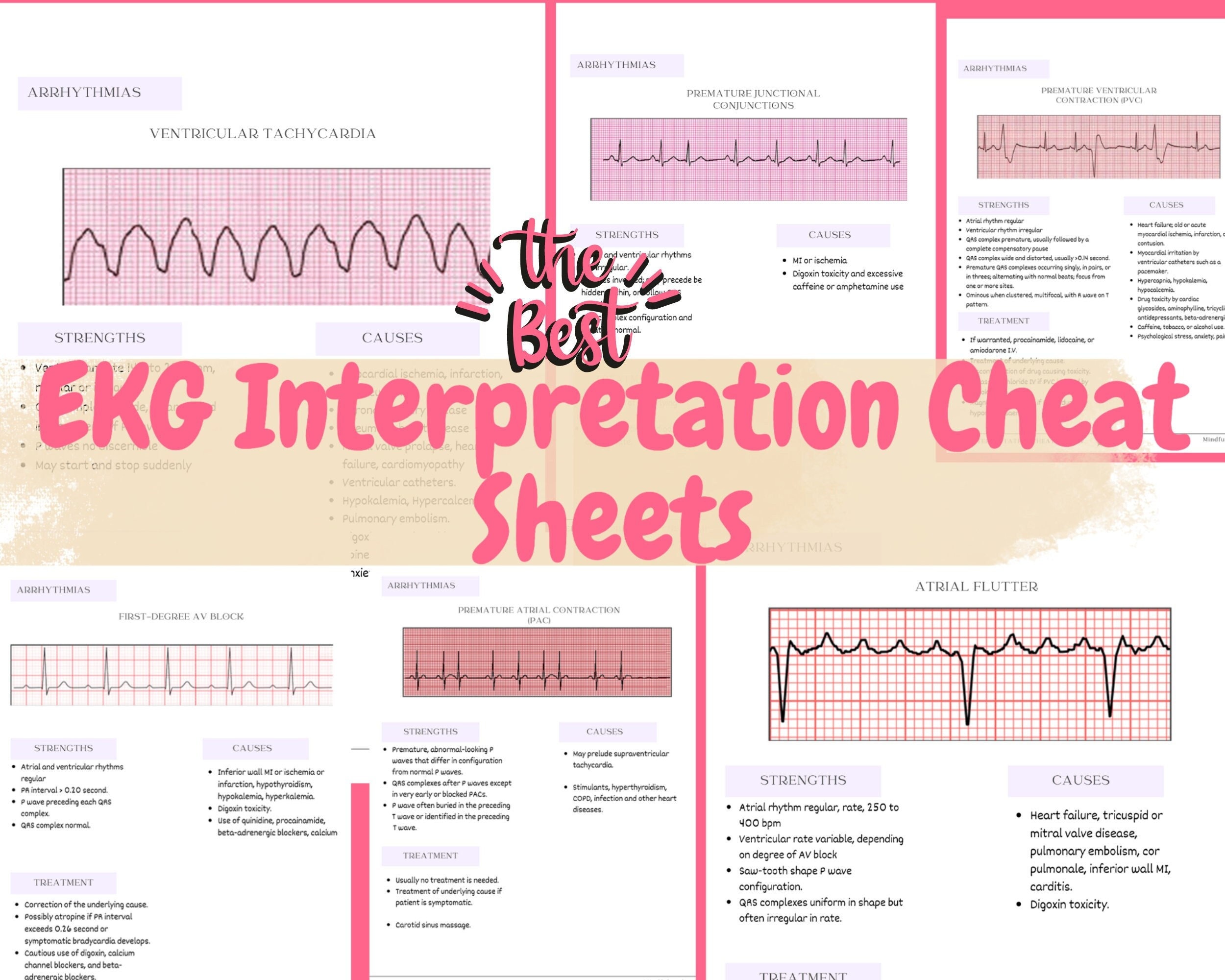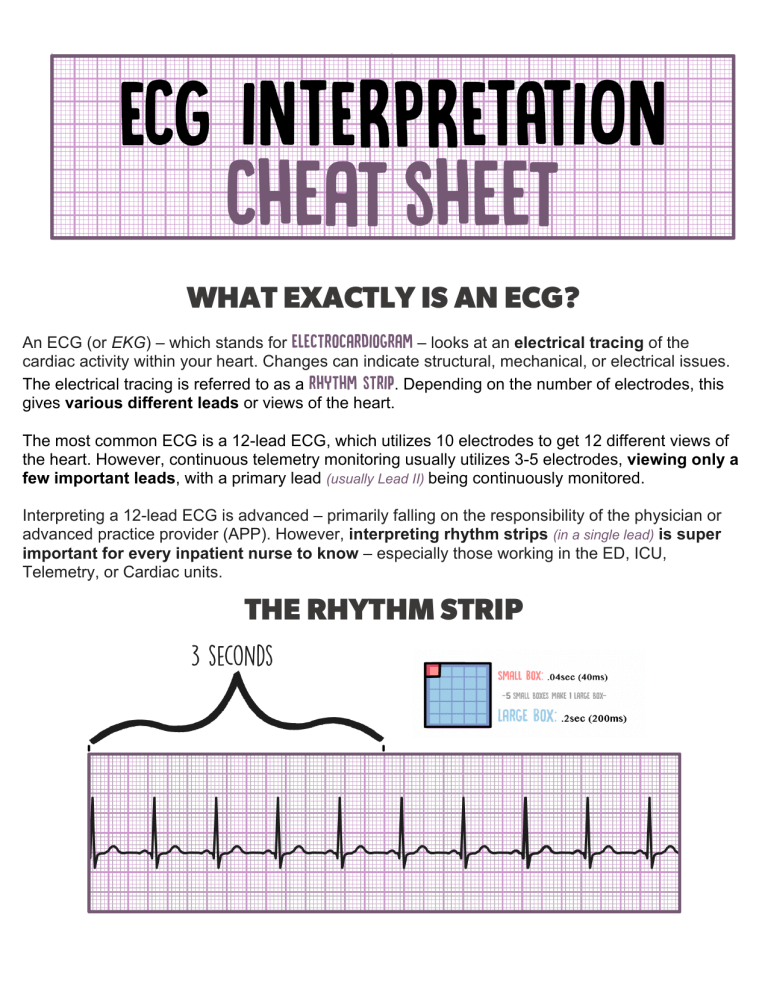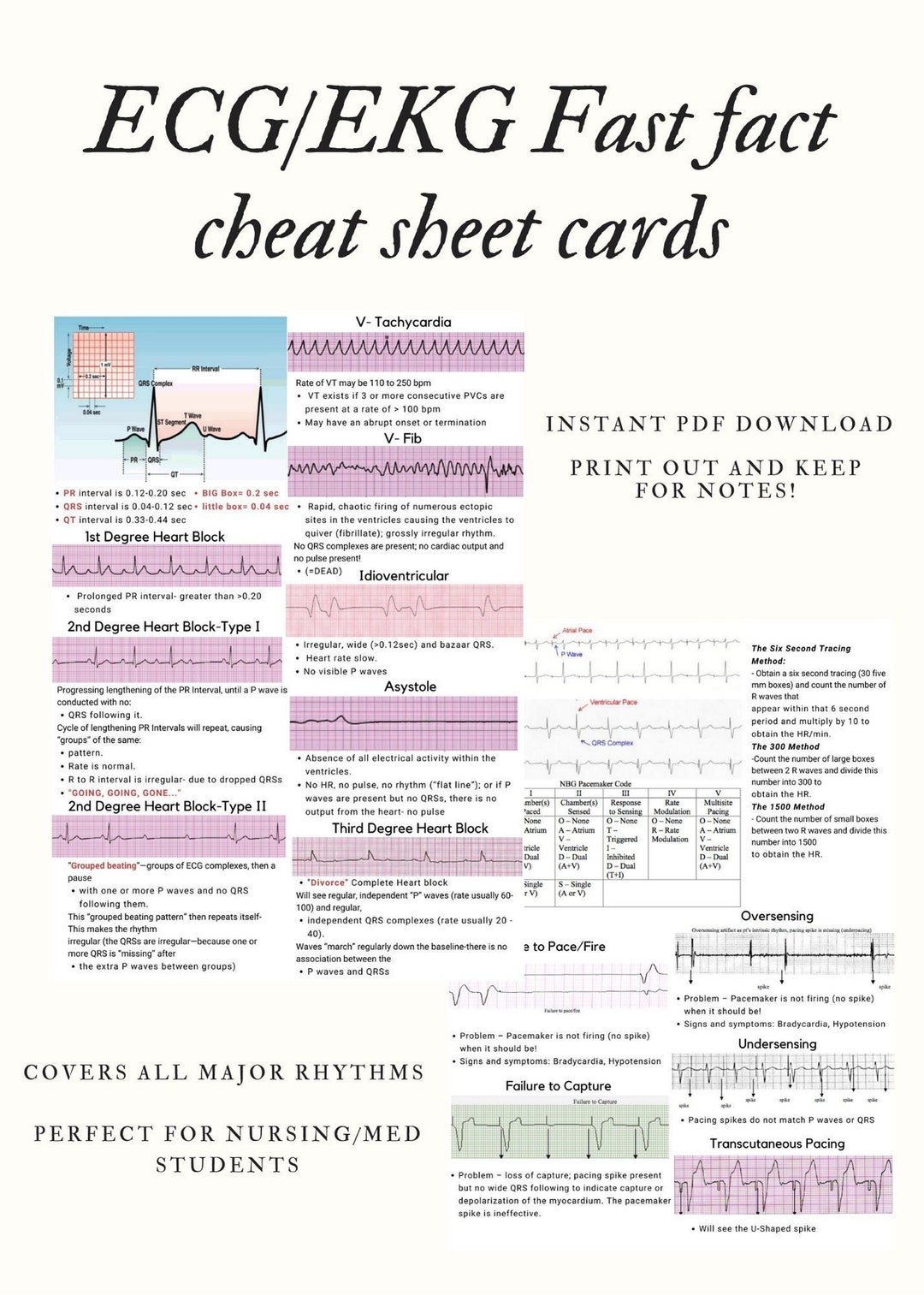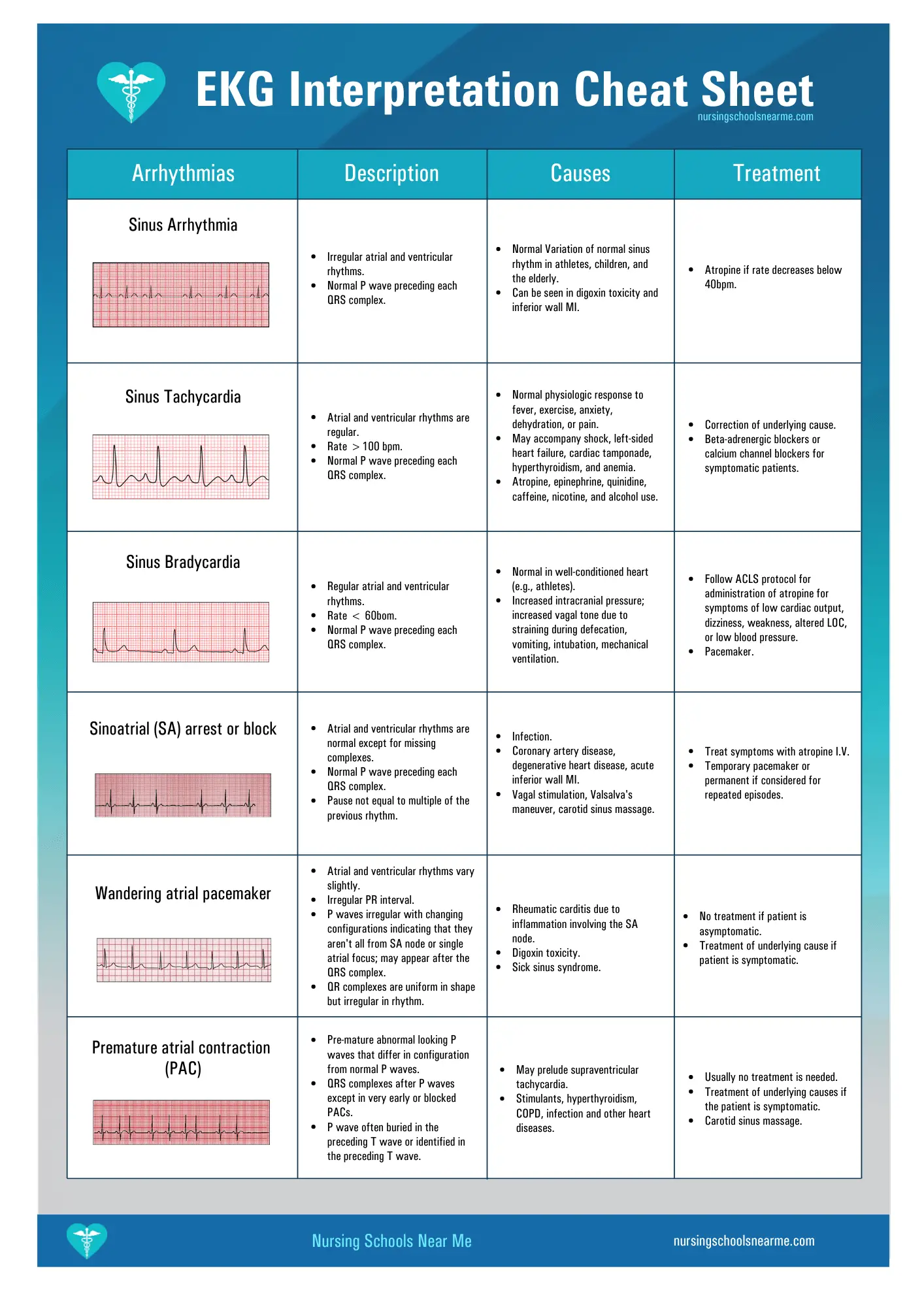Printable 12 Lead Ekg Interpretation Cheat Sheet
Printable 12 Lead Ekg Interpretation Cheat Sheet - Unlock the secrets of ekg interpretation with our free cheat sheet. Stanley’s heart mnemonic ™ acronym (h ypertrophy, e xtent of the ecg intervals, ecg a xis, q r s. It discusses electrophysiology, the lead reference system, waveforms and intervals, ekg paper, and how to interpret various components of an. Covers rhythm strip analysis, intervals, segments, waves, and ectopic beats. Should be positive in lead ii. Interpreting rhythm strips is important for nurses to monitor a patient's heart rhythm and detect any abnormalities. From identifying key components of the heart rhythm to recognizing. Lead placement • correct placement a must • small changes in height of r wave are important • can be produced with slight movement of leads Master cardiac rhythms, arrhythmias, and more for better patient care. Quick guide to ecg rhythm interpretation for nurses. A cheat sheet for ekgs by category. Unlock the secrets of ekg interpretation with our free cheat sheet. Master cardiac rhythms, arrhythmias, and more for better patient care. This document summarizes ekg interpretation. This means they’ve got 3 to 5 leads. •describe how the 12 lead ecg portrays the electrical activity of the heart •differentiate between ischemia, injury and infarction For each category, a sample ekg tracing and key features of the tracing are provided. ♥ sinus rhythm (which is the normal rhythm) has the following characteristics: Ecg 12 lead basics cheat sheet by sjacobs via cheatography.com/59806/cs/15660/ the cardio vas cular system the heart forms a part of the greater cardio vas cular system which is. Quick guide to ecg rhythm interpretation for nurses. Most cardiac patients are on a telemetry monitor. •describe how the 12 lead ecg portrays the electrical activity of the heart •differentiate between ischemia, injury and infarction Lead placement • correct placement a must • small changes in height of r wave are important • can be produced with slight movement of leads P waves (pr >.20) 2. 12 lead. Stanley’s heart mnemonic ™ acronym (h ypertrophy, e xtent of the ecg intervals, ecg a xis, q r s. Unlock the secrets of ekg interpretation with our free cheat sheet. This document summarizes ekg interpretation. Key aspects of the rhythm strip include intervals like the pr and qt, and. Results in 12 different views of the heart. ♥ sinus rhythm (which is the normal rhythm) has the following characteristics: Unlock the secrets of ekg interpretation with our free cheat sheet. From identifying key components of the heart rhythm to recognizing. •describe how the 12 lead ecg portrays the electrical activity of the heart •differentiate between ischemia, injury and infarction It discusses electrophysiology, the lead reference system, waveforms. Stanley’s heart mnemonic ™ acronym (h ypertrophy, e xtent of the ecg intervals, ecg a xis, q r s. ♥ sinus rhythm (which is the normal rhythm) has the following characteristics: Interpreting rhythm strips is important for nurses to monitor a patient's heart rhythm and detect any abnormalities. This means they’ve got 3 to 5 leads. Lead placement • correct. P waves (pr >.20) 2. It discusses electrophysiology, the lead reference system, waveforms and intervals, ekg paper, and how to interpret various components of an. •describe how the 12 lead ecg portrays the electrical activity of the heart •differentiate between ischemia, injury and infarction Unlock the secrets of ekg interpretation with our free cheat sheet. Should be positive in lead. This ekg interpretation cheat sheet will help you understand the basics of reading and analyzing ekgs. Covers rhythm strip analysis, intervals, segments, waves, and ectopic beats. P waves (pr >.20) 2. ♥ sinus rhythm (which is the normal rhythm) has the following characteristics: Master cardiac rhythms, arrhythmias, and more for better patient care. Lead placement • correct placement a must • small changes in height of r wave are important • can be produced with slight movement of leads Quick guide to ecg rhythm interpretation for nurses. Stanley’s heart mnemonic ™ acronym (h ypertrophy, e xtent of the ecg intervals, ecg a xis, q r s. To download and print them in full. P waves (pr >.20) 2. Should be positive in lead ii. Lead placement • correct placement a must • small changes in height of r wave are important • can be produced with slight movement of leads There you have it, 5 lead ecg placement simplified. From identifying key components of the heart rhythm to recognizing. Quick guide to ecg rhythm interpretation for nurses. ♥ sinus rhythm (which is the normal rhythm) has the following characteristics: Interpreting rhythm strips is important for nurses to monitor a patient's heart rhythm and detect any abnormalities. Stanley’s heart mnemonic ™ acronym (h ypertrophy, e xtent of the ecg intervals, ecg a xis, q r s. This document summarizes ekg. Should be positive in lead ii. It discusses electrophysiology, the lead reference system, waveforms and intervals, ekg paper, and how to interpret various components of an. From identifying key components of the heart rhythm to recognizing. For each category, a sample ekg tracing and key features of the tracing are provided. ♥ sinus rhythm (which is the normal rhythm) has. Covers rhythm strip analysis, intervals, segments, waves, and ectopic beats. From identifying key components of the heart rhythm to recognizing. Stanley’s heart mnemonic ™ acronym (h ypertrophy, e xtent of the ecg intervals, ecg a xis, q r s. Lead placement • correct placement a must • small changes in height of r wave are important • can be produced with slight movement of leads For each category, a sample ekg tracing and key features of the tracing are provided. This ekg interpretation cheat sheet will help you understand the basics of reading and analyzing ekgs. Ecg 12 lead basics cheat sheet by sjacobs via cheatography.com/59806/cs/15660/ the cardio vas cular system the heart forms a part of the greater cardio vas cular system which is. •describe how the 12 lead ecg portrays the electrical activity of the heart •differentiate between ischemia, injury and infarction Most cardiac patients are on a telemetry monitor. It discusses electrophysiology, the lead reference system, waveforms and intervals, ekg paper, and how to interpret various components of an. There you have it, 5 lead ecg placement simplified. Should be positive in lead ii. This means they’ve got 3 to 5 leads. Interpreting rhythm strips is important for nurses to monitor a patient's heart rhythm and detect any abnormalities. This document summarizes ekg interpretation. Quick guide to ecg rhythm interpretation for nurses.Best Way To Learn 12 Lead Ecg Just For Guide
12 Lead EKG Interpretation Cheat Sheet
Printable 12 Lead Ekg Interpretation Cheat Sheet
The Best EKG Interpretation & Heart Arrhythmias Cheat Sheet ,cheat
ECG Interpretation Cheat Sheet
Printable 12 Lead Ecg Cheat Sheet Printable Vocabulary Flashcards
How To Read A 12 Lead Ecg SHO NEWS
ECG/EKG Fast Fact Cheat Sheet Card Etsy
Printable 12 Lead Ecg Cheat Sheet Printable Vocabulary Flashcards
EKG Interpretation Cheat Sheet Nursing Schools Near Me
P Waves (Pr >.20) 2.
Unlock The Secrets Of Ekg Interpretation With Our Free Cheat Sheet.
To Download And Print Them In Full Color, Go To:
Master Cardiac Rhythms, Arrhythmias, And More For Better Patient Care.
Related Post:









